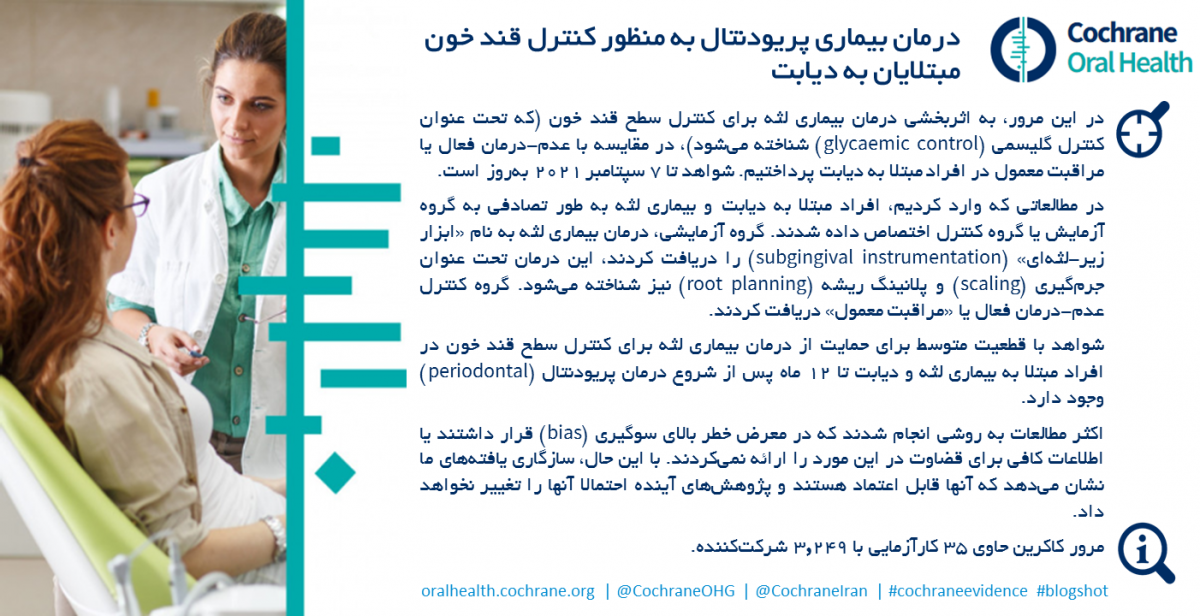
We spoke to Cochrane Oral Health Author Terry Simpson about the updated review Treatment of periodontitis for glycaemic control in people with diabetes mellitus. He explains the results of this review and what it means for the research community as well as medical, nursing, and dental professionals - with thanks also to Josh Twigg, Ambrina Qureshi, Sarah Wild, Ian Needleman and Laura MacDonald.
Terry, can you tell us about this updated Cochrane Review?
Our review of studies evaluating the impact of treatment of periodontitis (gum disease) on glycaemic control in people with diabetes was originally published in 2010 (based on a protocol published in 2004) and first updated in 2015. For the 2022 update, we divided the review in two due to the sheer volume of studies on this topic and to account for the clear divide that has emerged in the research, focusing on two different key questions. This update answers the question: how does treatment of periodontitis compare to usual care or no treatment for improving glycaemic control in people with diabetes; the second part of the update will compare different approaches to treatment of periodontitis against one another, to assess if there is a gold standard for treatment.
This first part of our update found that glycaemic (blood sugar) control in people with diabetes can be improved with treatment of periodontitis. The improvement in diabetic control from treating any periodontitis appears to be approximately equivalent to the threshold for determining effectiveness of an additional diabetes drug - but without the side effects.

What does it mean for the research community?
For the first time since this review began, we have shown that we do not need to conduct further randomised controlled trials that compare periodontal treatment against no treatment or usual care in people who have both diabetes and periodontitis. Within the population of people with diabetes, there is the potential for individuals to improve glycaemic control through treating their periodontitis and therefore we recommend that research should not withhold periodontal treatment from such people for the purpose of a research study that is highly unlikely to add new information to the evidence base. Trials comparing different approaches to periodontal treatment may still be useful, while qualitative studies and process evaluations will be helpful to establish how best to optimise the provision of effective periodontal treatment in primary care settings and to support patients to improve their periodontal health and oral hygiene practices.
Given the evidence is clear, what needs to change?
As treatment of periodontitis in people who also have diabetes can have a beneficial effect on metabolic control (glycaemic levels), it is important that there is better communication between dental and medical professionals managing patients with diabetes and periodontitis as this will facilitate appropriate treatment to minimise risk of complications of diabetes. Unfortunately, care pathways between diabetes and oral health do not exist for most patients. Therefore, healthcare policy and guidance are needed to establish such funded pathways.
For dental professionals, greater awareness is required regarding effective monitoring and treatment of diabetic patients with periodontitis. Professional development for all relevant healthcare staff (including diabetologists, other medical and nursing teams dealing with diabetic patients and the dental professionals) must be delivered to transfer knowledge, address barriers and support implementation. Partnering with organisations that provide information and support for people with diabetes and oral health would be helpful.
Governments may wish to review how socially funded health schemes are addressing the need for periodontal care, particularly among people with diabetes, where the potential for improvement in health and quality of life may be profound. The role of periodontal specialists in providing training and advice on referral for further management is critical in ensuring the dental workforce is equipped to manage this group of patients to the best standard.
Groups formulating guidelines on diabetes or periodontitis should incorporate the findings of our review so that appropriate educational resources are available for professionals and patients. In the UK, we are aware that NICE have already undertaken this responsibility.

How can clinicians working in this field change what they do?
Medical and nursing professionals should ask all patients diagnosed with diabetes whether they have had a dental visit to get their gums checked and to emphasise the importance of gum health in diabetes management. They can signpost or refer their patients to dental professionals in the case of any unusual presentation or poor oral health identified during general screening on follow-up visits. Similarly, dental professionals (dentists and hygienists/therapists) can advise all patients with diabetes of their increased risk of gum disease and the benefits of good gum health for their overall health and wellbeing. Regular screening of gum health should continue to be provided to all patients, with detailed assessment for those identified at risk of periodontitis. Most patients will continue to be suitable for treatment under the care of a general dentist. However, for people with more severe gum disease and where gum disease is not responding to treatment, referral to a specialist (periodontist) should be considered where available.
Dental and medical professionals can familiarise themselves with the evidence about the links between periodontitis and diabetes. Both professions can assist in the process of educating patients about this relationship. Dentists can play a role in screening for diabetes, considering the possibility of undiagnosed diabetes in patients with risk factors (such as increasing age, higher BMI, non-white ethnicity, family history of diabetes) and the presence of periodontitis, particularly when the condition is severe. They should be able to inform patients of local options for testing for diabetes.
Where can clinicians find out more?
- Our Cochrane Review
- New NICE guidance
- NHS England commissioning standards for dental services for people with diabetes
- The Scottish Dental Clinical Effectiveness Programme leaflet for patients Diabetes and Your Oral Health: Prevention of Gum Disease
- The British Society of Periodontology leaflets about gum health:
- Gum Health Awareness (for patients)
- Gum Health Awareness: Health Care Professionals (for healthcare staff)
- Diabetes.co.uk online article Diabetes and Dental Health
- Mouth Healthy online article Diabetes and Your Smile
Tuesday, July 19, 2022
